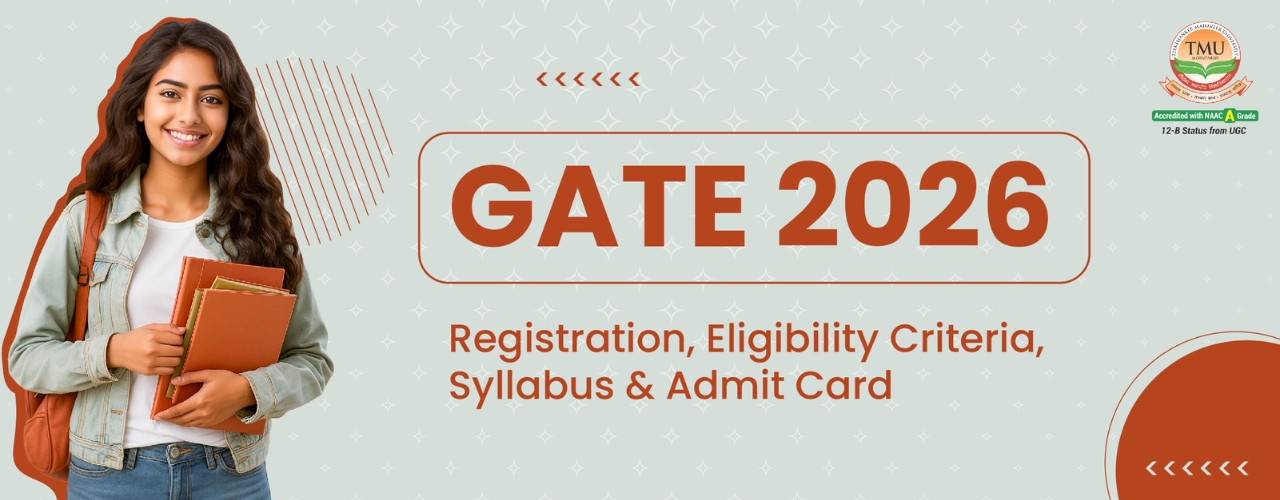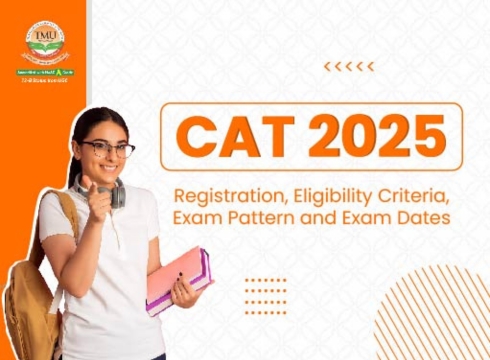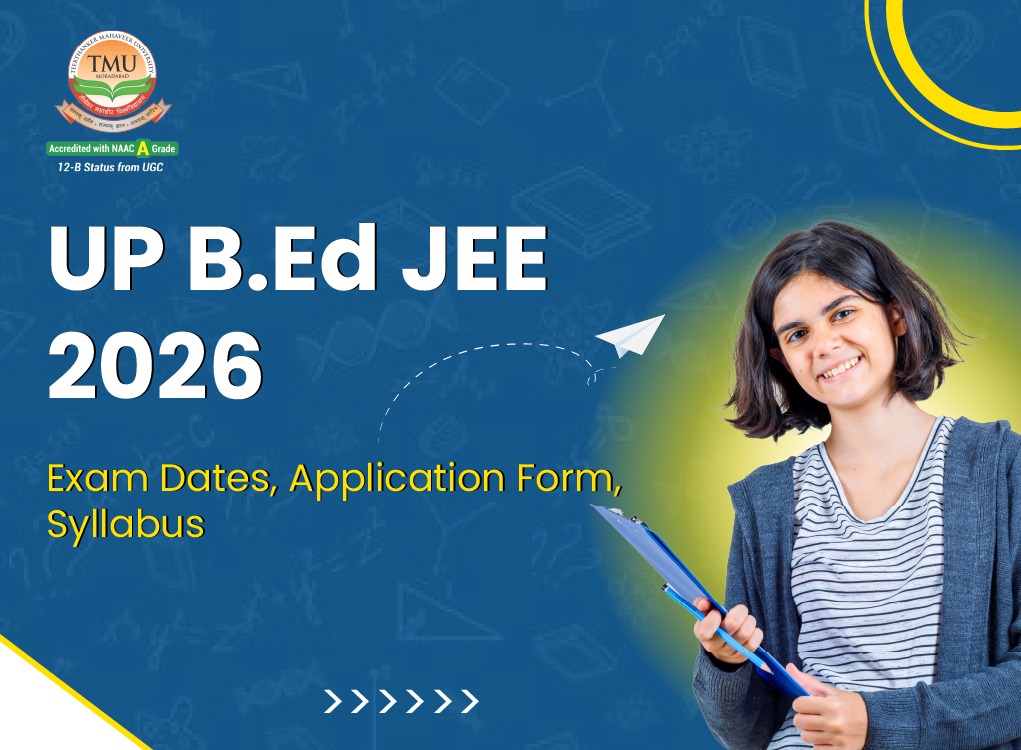GATE 2026: Registration, Eligibility Criteria, Syllabus & Admit Card
Table of Contents
GATE 2026 exam: GATE is a prestigious national-level examination designed to assess student’s conceptual understanding and problem-solving ability in different undergraduate-level subjects like engineering, technology, science, commerce, arts, architecture, and the humanities. The Indian Institute of Technology Guwahati conducts the exam.
A GATE-qualified student can seek admission with possible financial assistance to master's programmes, direct PhD, and PhD programmes in engineering, technology, science, architecture, and humanities at colleges supported by the Ministry of Education (MoE) and other government bodies. Some colleges or institutions also accept GATE scores for admission to their postgraduate courses without MoE scholarship.
GATE 2026 Overview
| Category | Details |
| Exam Name | GATE (Graduate Aptitude Test in Engineering) |
| Organizing Institute | IIT Guwahati |
| Exam Dates | 7, 8, 14 & 15 February 2026 |
| Mode of Exam | Computer-Based Test (CBT) |
| Total Papers | 30 Subjects |
| New Addition | Energy Science (XE-I) paper |
| Registration Start Date | 28 August 2025 |
| Last Date to Register (Without Late Fee) | Extended till 6 October 2025 |
| Question Types | MCQ, MSQ, NAT |
| Total Questions | 65 |
| Exam Duration | 3 Hours (4 Hours for compensatory time candidates) |
| Marking Scheme | 1 & 2 mark questions; Negative marking for MCQs only |
| Language of Exam | English |
| Sections | General Aptitude (GA) + Subject Paper (some include Engineering Mathematics) |
| Announcement of Results | Thursday, March 19, 2026 |
Teerthanker Mahaveer University
Apply for Admission
Click Here To Apply for Admission
GATE 2026 Exam Date
| Day & Date | Time (IST) | Session | Test Papers |
Saturday February 07, 2026 | 9:30 am – 12:30 pm | Forenoon (FN) | AG, ES, GG, IN, MA, MN, TF, XE, XL |
| 2:30 pm – 5:30 pm | Afternoon (AN) | AE, BT, CH, CY, GE, PH, XH | |
Sunday February 08, 2026 | 9:30 am – 12:30 pm | Forenoon (FN) | CS-1, ST |
| 2:30 pm – 5:30 pm | Afternoon (AN) | CS-2, EY, NM, PE | |
Saturday February 14, 2026 | 9:30 am – 12:30 pm | Forenoon (FN) | CE-1, EE, PI |
| 2:30 pm – 5:30 pm | Afternoon (AN) | BM, CE-2, ME, MT | |
Sunday February 15, 2026 | 9:30 am – 12:30 pm | Forenoon (FN) | EC |
| 2:30 pm – 5:30 pm | Afternoon (AN) | AR, DA |
Read More: GATE 2026 Exam Schedule Out: Check Exam Dates & Syllabus
GATE 2026 Exam Pattern
| Particulars | Details |
| Mode of Examination | Computer-Based Test (CBT) |
| Language of Examination | English |
| Duration | 3 Hours |
| Number of Papers (Subjects) | 30 Test Papers |
| Sections | General Aptitude (GA) + Candidate's Selected Subject(s) |
| Type of Questions | (a) Multiple Choice Questions (MCQ) (b) Multiple Select Questions (MSQ) (c) Numerical Answer Type (NAT) |
| Testing of Abilities | (a) Recall (b) Comprehension (c) Application (d) Analysis & Synthesis |
| Marks Distribution (for all papers EXCEPT AR, CY, DA, EY, GE, GG, MA, PH, ST, XH, XL) |
|
| Marks Distribution (for papers AR, CY, DA, EY, GE, GG, MA, PH, ST, XH, XL) |
|
| Marking Scheme | Questions carry either 1 or 2 marks |
| Negative Marking | Only for MCQs:
No negative marking for MSQ & NAT. No partial marking in MSQ |
GATE 2026 Exam – Paper-wise Marks Distribution & Structure
| Paper Code | GA Marks | Subject: Compulsory Section | Subject: Optional Section | Total Marks | Time |
| AE, AG, BM, BT, CE, CH, CS, EC, EE, ES, IN, ME, MN, MT, NM, PE, PI, TF | 15 | 85 (includes Engineering Mathematics – 13 marks) | -- | 100 | 180 |
| CY, DA, EY, MA, PH, ST | 15 | 85 | -- | 100 | 180 |
AR (Part A compulsory; choose B1/B2 in exam): B1 – Architecture B2 – Planning | 15 | 60 | 25 | 100 | 180 |
GE (Part A compulsory; choose B1/B2 in exam): B1 – Surveying & Mapping B2 – Image Processing & Analysis | 15 | 55 | 30 | 100 | 180 |
GG (Part A compulsory; choose B1/B2 at application time): B1 – Geology B2 – Geophysics | 15 | 25 | 60 | 100 | 180 |
| XE (Section A – Engineering Mathematics compulsory; select any TWO other sections) | 15 | 15 | 2 × 35 | 100 | 180 |
| XH (Section B1 compulsory; select ONE optional section at application time.) | 15 | 25 | 60 | 100 | 180 |
| XL (Section P – Chemistry compulsory; select any TWO optional sections) | 15 | 25 | 2 × 30 | 100 | 180 |
GATE 2026 Exam Papers & Syllabus
GATE 2026 Exam Papers
| GATE Test Paper | Code | GATE Test Paper | Code |
| Aerospace Engineering | AE | Geology & Geophysics | GG |
| Agricultural Engineering | AG | Instrumentation Engineering | IN |
| Architecture and Planning | AR | Mathematics | MA |
| Biomedical Engineering | BM | Mechanical Engineering | ME |
| Biotechnology | BT | Mining Engineering | MN |
| Civil Engineering | CE | Metallurgical Engineering | MT |
| Chemical Engineering | CH | Naval Architecture & Marine Engineering | NM |
| Computer Science & Information Technology | CS | Petroleum Engineering | PE |
| Chemistry | CY | Physics | PH |
| Data Science & Artificial Intelligence | DA | Production & Industrial Engineering | PI |
| Electronics & Communication Engineering | EC | Statistics | ST |
| Electrical Engineering | EE | Textile Engineering & Fibre Science | TF |
| Environmental Science & Engineering | ES | Engineering Sciences | XE |
| Ecology and Evolution | EY | Humanities & Social Sciences | XH |
| Geomatics Engineering | GE | Life Sciences | XL |
GATE 2026 Exam Syllabus Structure
The GATE paper follows this pattern:
General Aptitude (Common for All Papers)
(15 Marks)
Included in every test paper.
Topics:
- Verbal Ability: grammar, vocabulary, sentence completion, comprehension
- Quantitative Aptitude: DI, algebra, arithmetic, probability
- Reasoning: analytical & logical reasonin
Subject-Specific Syllabus (Varies per Paper)
Computer Science (CS)
- Programming & Data Structures
- Algorithms
- Operating Systems
- Databases
- Computer Networks
- Digital Logic
- Theory of Computation
- Compiler Desig
Mechanical Engineering (ME)
- Thermodynamics
- Heat Transfer
- Fluid Mechanics
- SOM
- Manufacturing
- Industrial Engineering
- Machine Design
Civil Engineering (CE)
- Structural Engineering
- Geotechnical Engineering
- Transportation Engineering
- Environmental Engineering
- Fluid Mechanics & Hydrology
Electronics & Communication (EC)
- Networks
- Signals & Systems
- Control Systems
- Analogue & Digital Circuits
- Communications
- Electromagnetics
Electrical Engineering (EE)
- Electric Circuits
- Machines
- Power Systems
- Signals
- Control Systems
- Power Electronic
Chemical Engineering (CH)
- Process Calculations
- Fluid Mechanics
- Heat & Mass Transfer
- Chemical Reaction Engineering
- Plant Design
Data Science & AI (DA)
- Probability & Statistics
- Data Analytics
- Machine Learning
- Deep Learning
- Databases
- Programming
GATE 2026 Exam Eligibility Criteria
| Degree / Program | Qualifying Degree / Examination | Eligible Candidates |
| B.E. / B.Tech. / B.Pharm. | Bachelor’s degree in Engineering/Technology (4 years after 10+2 OR 3 years after B.Sc./Diploma) | Currently in 3rd year or higher OR completed |
| B.Arch. | Bachelor’s degree in Architecture (5-year course) / Naval Architecture (4-year course) / Planning (4-year course) | Currently in 3rd year or higher OR completed |
| B.Sc. (Research) / B.S. | Bachelor’s degree in Science (Post-diploma/4 years after 10+2) | Currently in 3rd year or higher OR completed |
| Pharm. D. (after 10+2) | 6-year Professional Pharmacy Doctoral Program (includes 1-year internship/residency) | Currently in 3rd / 4th / 5th / 6th year OR completed |
| M.B.B.S. / B.D.S. / B.V.Sc. | Professional Medical Degrees | 5th / 6th / 7th semester or higher OR completed |
| M.Sc. / M.A. / MCA or equivalent | Master’s degree in Arts/Science/Mathematics/Statistics/Computer Applications or equivalent | Currently in 1st year or higher OR completed |
| Int. M.E./M.Tech. (Post-B.Sc.) | Post-B.Sc. Integrated Master’s degree in Engineering/Technology (4-year program) | Currently in 1st / 2nd / 3rd / 4th year OR completed |
| Int. M.E./M.Tech./M.Pharm. or Dual Degree (after Diploma or 10+2) | Integrated Master’s or Dual Degree program in Engineering/Technology (5-year program) | Currently in 3rd / 4th / 5th year OR completed |
| B.Sc. / B.A. / B.Com. | Bachelor’s degree in Science/Arts/Commerce (3-year program) | Currently in 3rd year OR completed |
| Int. M.Sc. / Int. B.S.-M.S. | Integrated M.Sc. or 5-year Integrated B.S.–M.S. program | Currently in 3rd year or higher OR completed |
| Professional Society Examinations* | B.E./B.Tech./B.Arch. equivalent exams recognised by MoE/UPSC/AICTE (e.g., AMIE, AMICE) | Completed Section A or equivalent |
| B.Sc. (Agriculture / Horticulture / Forestry) | 4-year program | Currently in 3rd / 4th year OR completed |
Application Process
Apply Online
Apply online by filling out the application form. The following data will be required while filling out the online application form.
- Personal Details: name, date of birth, personal mobile number, name and mobile number of parent or guardian
- Address for communication, including PIN code
- Details of the Eligibility degree
- Institute/College name and address with PIN Code
- Choice(s) of GATE test paper(s)
- Choices of three GATE Examination cities from the same zone
- Net-banking/debit card/credit card/UPI/wallet details for fee payment
Generate ID & Password
- After successful completion of the registration details, a unique Registration ID will be generated.
- You need to set up a password for your account.
Log-in with ID & Password
- You can log in to your account with your registration ID and password.
- You can finalise your registration process by verifying and editing any information as necessary.
Required Documents
- Good quality image of the candidate’s signature conforming to the specifications
- Scanned copy of a valid photo ID document (ID)
(The same ID, in original, MUST be produced while appearing for the GATE 2026 examination at the centre) - Scanned copy of the Category (SC/ST) certificate, if applicable, in PDF format
- Scanned copy of UDID (preferred)/PwD Certificate, if applicable, in PDF format
- Scanned copy of Dyslexic Certificate, if applicable, in PDF format
- Relevant Annexure(s), if applicable, in PDF format
Submit & Pay the fee
- You must review all the information thoroughly before saving and submitting.
- After submission, pay the application fee.
GATE 2026: A Gateway to Opportunities
GATE 2026 is an important exam for students aspiring to build a career in the field of engineering. Here’s the reason why:
- Postgraduate Admission: By qualifying for the GATE examination, you will be eligible for admission to master's and PhD programmes in top universities (IITs, NITs, and other government-supported universities), as well as financial assistance from MHRD.
- PSU Jobs: The major benefit of qualifying for the GATE 2026 exam is that Public Sector Undertakings (PSUs) use GATE scores for recruitment. It gives students a chance to get a well-paying and stable government job.
- Higher Education Abroad: GATE-qualified students get higher education opportunities in foreign countries like Germany or Singapore.
- Research Opportunities: National labs like CSIR labs, DRDO, ISRO, and BARC offer research opportunities to GATE-qualified students.
TMU – A Gateway to Aspiring Engineers
Teerthankar Mahaveer University is considered a dream destination for every engineering aspirant. Even if you don’t qualify for the national-level entrance exams, like GATE, TMU provides you with an excellent opportunity to pursue an engineering programme through its own admission process. TMU believes that talent can never be restricted by a single exam result. It helps students develop real-world skills and confidence.
Conclusion
The GATE exam is a Graduate Aptitude Test in Engineering, a prestigious national-level examination. The purpose of this exam is to assess the student’s conceptual understanding and problem-solving ability in different undergraduate-level subjects like engineering, technology, science, commerce, arts, architecture, and the humanities.
The exam is conducted by the IISc and all IITs, on behalf of the National Coordination Board (NCB), Department of Higher Education, Ministry of Education (MoE), Government of India. IIT Guwahati is the Organising Institute for GATE 2026.
FAQ
Q1. When to apply for the GATE 2026 exam?
Ans. The application period for the GATE 2026 exam has passed, with registration closing in early October 2025
Q2. What is the GATE cut-off for 2026?
Ans. The GATE 2026 cutoff varies by branch and category, but expected qualifying marks are approximately in the 25-32 range for General category candidates, depending on the paper.
Q3. Will GATE 2026 be postponed?
Ans. No, the GATE 2026 exam will not be postponed.
Q4. Who is going to conduct the GATE 2026 exam?
Ans. The Indian Institute of Technology Guwahati joins the Indian Institute of Science (IISc) Bangalore and six other IITs—Bombay, Delhi, Kanpur, Kharagpur, Madras, and Roorkee—in administering the Graduate Aptitude Test in Engineering (GATE).
Q5. Can I use a physical calculator during the examination?
Ans NO, Candidates are not allowed to bring a physical calculator during the examination.















